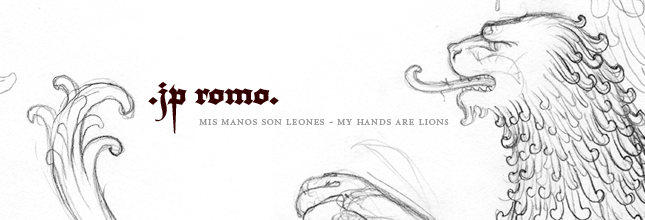
Un día se me ocurrió mezclar partes de cosas viejas. Tenía escritos unos versos de La otra orilla, de José Carlos Becerra; tenía dibujada media mujer estoicamente caritativa de Bouguereau; tenía pedazos de ilustraciones para Chaleur de The Incognito Traveller... A veces las cosas (y las personas) encuentran pareja en lugares insospechados.
«y fue como si una mano enguantada tuviera todas las cosas en el puño»

[...]
Y estoy en esta ciudad como en otra canción que tampoco recuerdo, que tal vez nunca estuvo en mis labios,
como en otra palabra que me ocupa gran parte del día
y luego en la noche es mi primera muerta.
Estoy en este parque donde los almendros apenas sugieren la brisa, el tiempo de las hojas,
bajo este cielo encallado en la mañana
como una inmensa nave antigua —recuerdo de otros dioses, de otros hombres
y de otras batallas—
y mi mirada abre de par en par los brazos para recibir al paisaje
pero es inútil, en el paisaje hay algo de mirada,
algo también con los brazos abiertos…
Una brisa muy joven sopla entre los almendros, una brisa lejana sopla entre mis labios,
y es el silencio,
el silencio de la torre de la iglesia bajo la luz del sol,
el silencio de la palabra iglesia, de la palabra almendro, de la palabra brisa.
Hay un radio encendido en un estanquillo cercano,
pasan unos novios —casi niños— cogidos de la mano,
el sol empuja la torre de la iglesia hacia otro mediodía…
Yo iba a decir algo; cogí la pluma para eso, cogí mi alma para eso;
¿qué iba a decir?
Así paso ese día caluroso y nublado,
así la torre de la iglesia empujada por el sol como un barco llevado por el viento,
cruzó por mi pecho, y luego la noche se cerró sobre las casas, sobre las aguas del río,
sobre la historia de aquella mañana,
y fue como si una mano enguantada tuviera todas las cosas en el puño.
Yo iba a decir algo, yo tenía esta pluma en la mano…
[...]Fragmento de La otra orilla de José Carlos Becerra.



